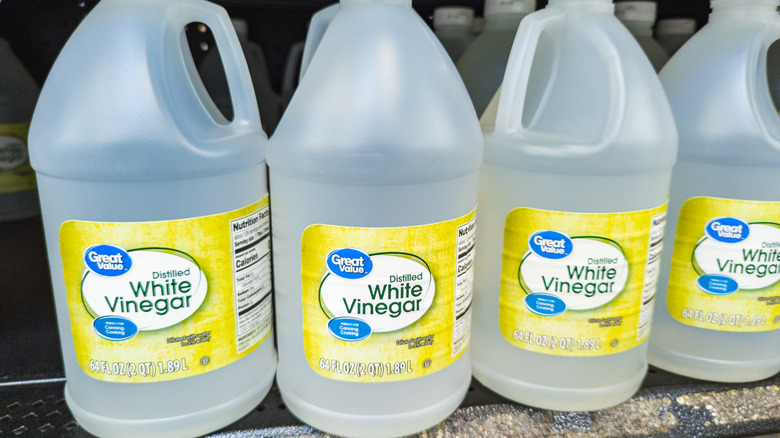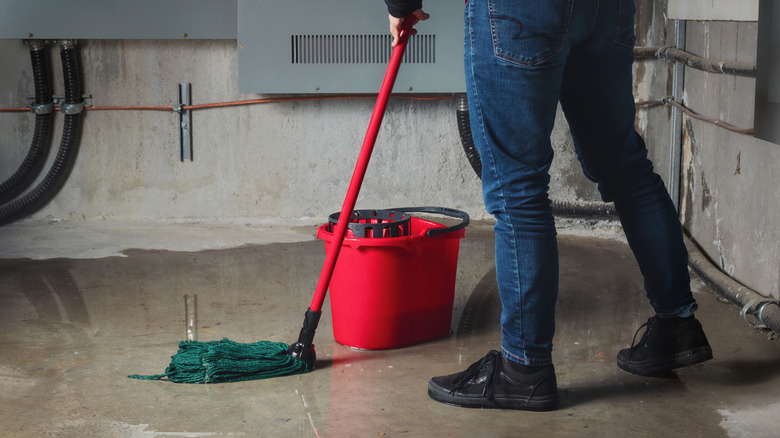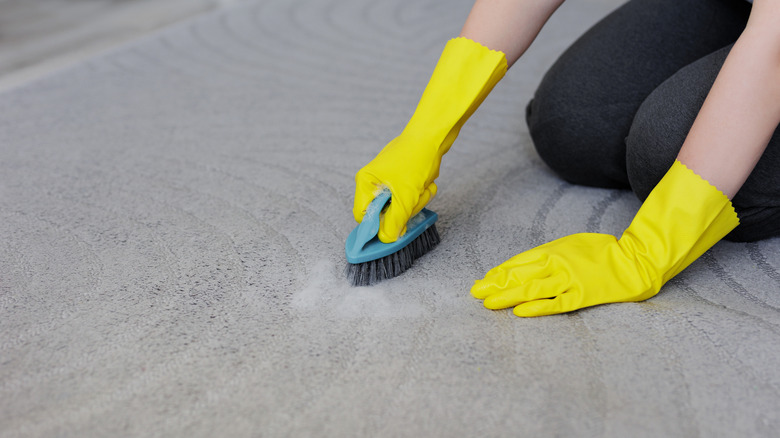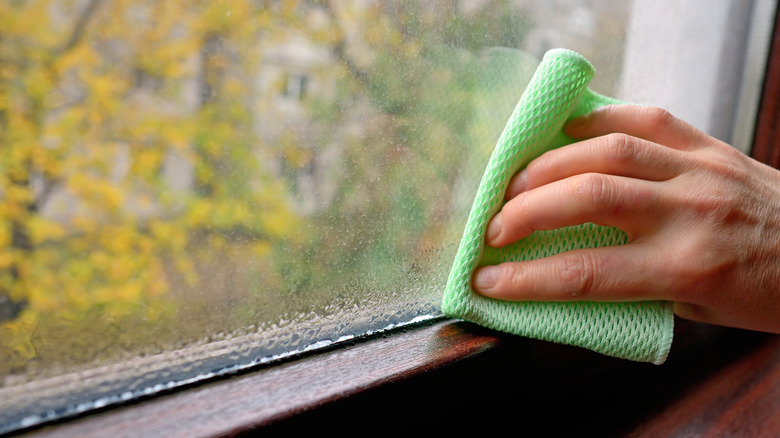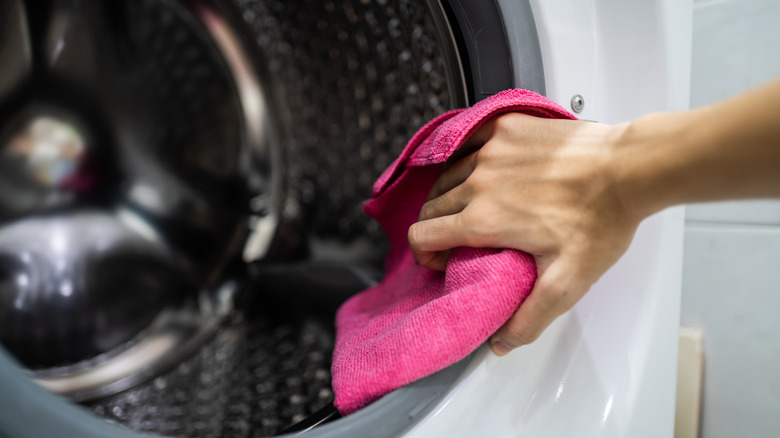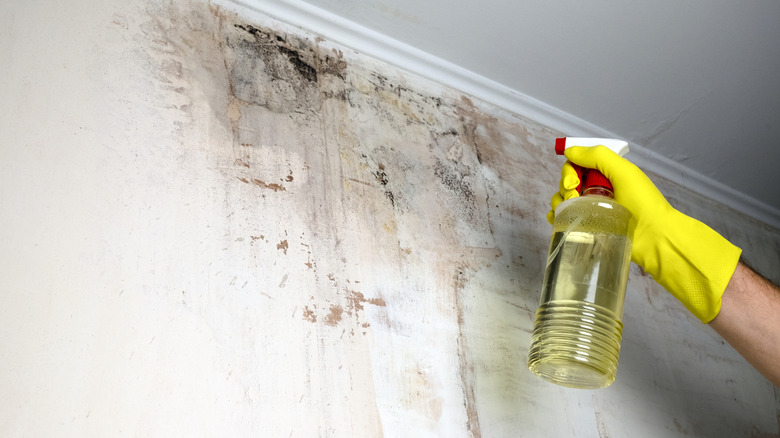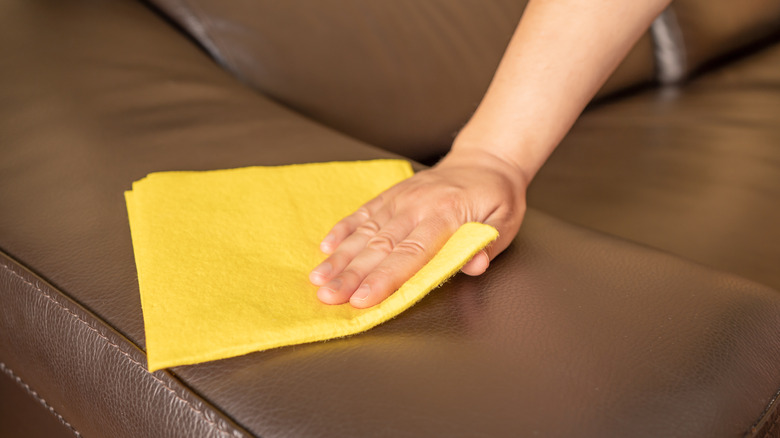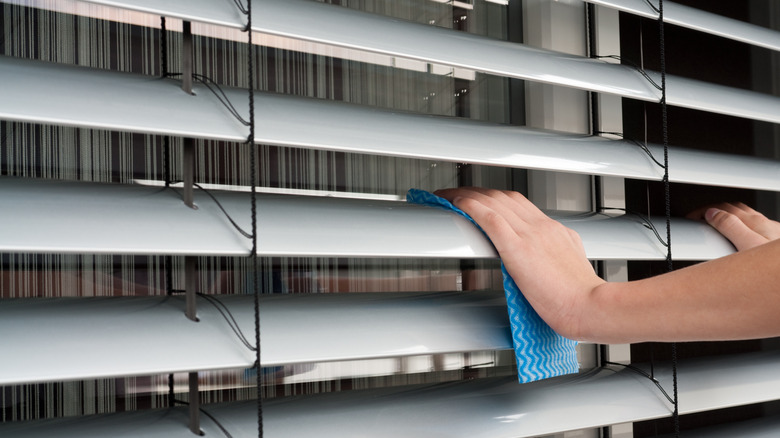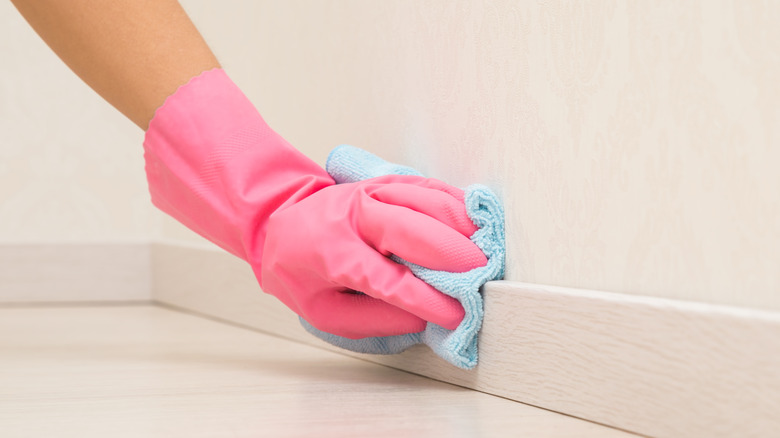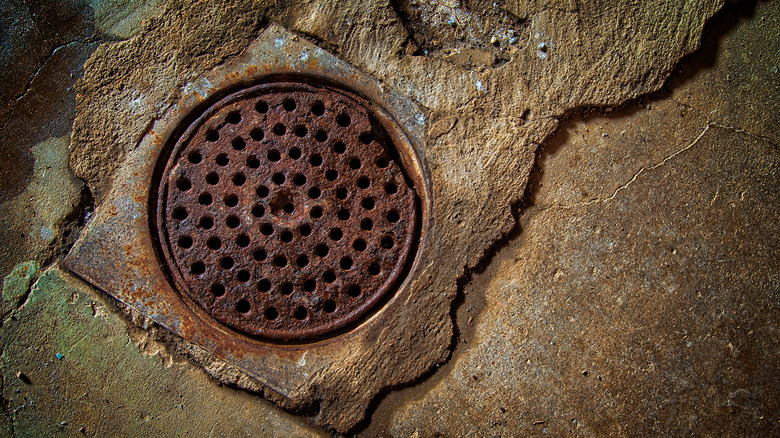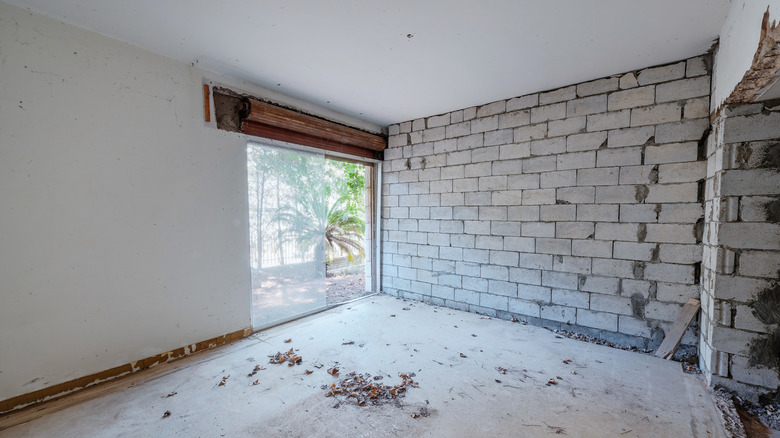How To Clean Your Entire Basement With Vinegar, From Floors To Walls
White vinegar is a kitchen staple that you probably have in your home right now. While you most likely keep it in your kitchen, vinegar has plenty of uses beyond cooking. Thanks to its high acetic acid content, vinegar is a versatile household cleaner. It breaks down dirt, grime, and even mold with ease on a variety of surfaces. Vinegar is a cost-effective, natural alternative to commercial cleaners that's surprisingly powerful.
DIY cleaning solutions made with vinegar are especially useful in basements. These spaces can get pretty dirty. From stained cinder block and concrete to clogged and smelly drains, basements require frequent cleaning. Due to the moisture that often builds up in these spaces, mold and mildew are also common problems homeowners deal with. Vinegar not only cleans and disinfects these surfaces, but it can also help prevent fungus from regrowing. Whether you use your basement as storage or living space, you'll want to keep the space clean and healthy. You can use vinegar to clean practically every surface in your basement, from floors to walls and everything in between.
Maintain concrete floors
Lots of basements have concrete floors that are notoriously hard to keep clean. Concrete's porous nature makes it susceptible to stains, so regular cleaning is essential for maintaining its condition. Dirt, mold, and oil are among the many substances concrete floors soak up. Vinegar's acidity helps break down grime on concrete. To make a cleaning solution, simply dilute equal parts vinegar and water. Use a mop or microfiber cloth to clean the floor in circular motions. For tough stains and grime, you can use a scouring pad or a bristled brush. Let the solution rest for 5 minutes to let the vinegar work its magic, then rinse with water.
Refresh carpets
If your basement's carpet is musty or stained, vinegar can help with that, too. It's a gentle cleaner that's tough on stains and dirt. Mix together equal parts vinegar and warm water and transfer them to a spray bottle. It's a good idea to test the solution on a small, inconspicuous area of your carpet first to make sure it doesn't cause any discoloration. Lightly mist the spots you want to clean and wait 5 to 10 minutes for the vinegar to break down the stain. Then, scrub with a dry cloth and rinse. For extra tough stains, try adding baking soda to the carpet before spraying. The chemical reaction will help lift the stain.
Make basement windows shine
Vinegar is excellent for keeping dirty basement windows clear and streak-free inside and out. The simplest way to use vinegar on windows is with an equal solution of vinegar and warm water. For especially dirty windows, you can make a cleaner with 1 cup of white vinegar, 1 ½ cups of rubbing alcohol, and 2 drops of dish soap. The dish soap and rubbing alcohol help break down oily smudges and fingerprints so you can enjoy windows without streaks.
Clean the washing machine
If your laundry is in the basement, this one is for you. Over time, mold, mildew, mineral deposits, and soap scum fill your washing machine with foul odors. These smells can even transfer to your clothes. Vinegar works well to resolve this common issue by dissolving the buildup. For top-load machines, run a hot water cycle and pause it when the tub is full. Then add 2 cups of vinegar and let the solution soak for an hour before completing the cycle. For front-loading machines, pour 1 cup of vinegar into the detergent dispenser and 1 cup into the drum. Then, apply the hottest sanitize cycle and allow to dry with the door open.
Clear up mold and mildew
Mold and mildew are common annoyances in basements. This is such a common issue because basements are prone to moisture buildup from flooding and humidity. Vinegar's acetic acid has been shown to negatively impact the growth of several microorganisms, making it an effective household mold cleaner for places like bathrooms and drywall. To clean mold and mildew with vinegar, spray undiluted vinegar onto the surface and let it sit for an hour. Then, you can use a brush to scrub away the mold.
Spot-clean leather couches
Regular cleaning is important for keeping your leather couches in good condition. When diluted with water, vinegar is gentle enough to use on your leather upholstery but strong enough to keep it clean. To make a cleaning solution, simply combine equal parts vinegar and water. You should test the solution on a hidden area of the couch first to guarantee it won't cause discoloration. Then, lightly spray the solution onto your couch or apply it with a cloth, and wipe it in a circular motion. Remove leftover vinegar with distilled water.
Keep blinds dust-free
Window blinds collect dust and grime fast, and when it settles into the grooves and crevices, it can be a pain to clean. Vinegar makes it easier to wipe grime away. To clean your basement blinds with vinegar, mix 1 part vinegar with 4 parts warm water. You can also add a couple of drops of dish soap for extra greasy blinds. Then, after dusting, use the solution to wipe down your blinds with a microfiber cloth.
Make your baseboards spotless
If your walls or floors are impacted by mold, dust, or grime, chances are your baseboards need some attention, too. A simple vinegar cleaner can handle dusty, grimy baseboards without damaging paint, leaving your baseboards spotless despite being an all-natural product. To make the cleaner, add a cup of vinegar and a few drops of dish soap to a small bucket of hot water. Then you can dip a cloth into the solution and wipe down your baseboards.
Clear basement floor drains
Your basement floor drain, also called a foundation drain, helps to prevent flooding and water damage to your home's foundation. These drains can become clogged or start to smell. You'll need to clean them from time to time, and a vinegar solution does the trick. After removing the drain cover and any large debris, slowly pour in a pot of boiling water and let it sit for about 15 minutes. Then, sprinkle some baking soda into the drain and cover all parts of the pipe. Pour vinegar into the drain and let it sit for another 15 minutes. The vinegar and baking soda will help break down grime. To finish, simply rinse away the vinegar with more boiling water.
Clean cinder block walls
Unfinished basements often have exposed cinder block walls. If this is the case in your basement, you already know how hard it is to keep them clean. Cinder block is a porous material that allows water, mineral deposits, dirt, and mildew to seep inside. Regular cleaning with vinegar can help prevent buildup and staining. With a solution of equal parts water and vinegar, scrub the wall with a brush or sponge. If a stain just won't come out, you can leave the solution to absorb into the cinder block for a few minutes before scrubbing.
